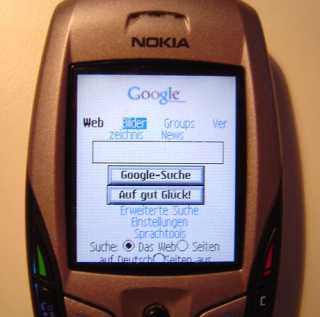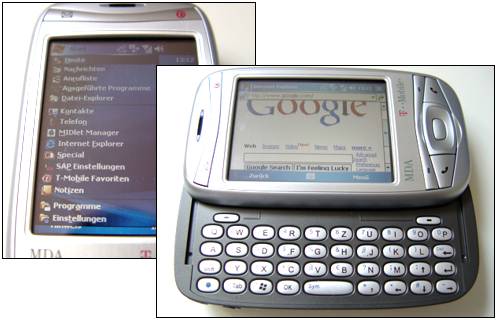Tuesday, January 9, 2007
Mobile Chaos Continues...
Today, Google announced another mobile partnership (this time with Samsung), and Yahoo released Yahoo Go 2.0 (this is not long after Ask released their mobile search, which didn’t include a search box). Yahoo Go will simply tell me that my phone is not supported when I try to access it with Internet Explorer on Windows Mobile 5.0. Indeed, the mobile platform is kind of confusing these days.
Years ago we had WML, and everyone scratched their head why people weren’t just reusing HTML, which is a (theoretically) platform-neutral language. Today, most mobile browsers do indeed understand any kind of (X)HTML – and not just stuff like XHTML Mobile Doctype, another redundant invention – but many web apps are moving in the direction of inaccessible DHTML (dynamic HTML, or more commonly called AJAX-applications now), giving mobile browsers a hard time.

NetFront Access was my favorite browser for a while but registering it/ buying it failed.
Developers who created a non-accessible DHTML site are left with two basic choices; program a secondary “static HTML” version of their site (takes work), or program a mobile application (also takes work, especially because technologies like Java MIDlets won’t work as cross-platform as they’re supposed to). Or, if you’re a big company – like Google – you do both, and offer e.g. Gmail as a mobile version and a mobile application (that’s additional to a “basic HTML” version actually, meaning there’s 4 flavors of Gmail).
Users, on the other hand, can then play around with several browsers available for their phone – they may have to decide between Opera Mobile and Opera Mini, and that’s just one vendor – but these browsers all show different results on websites, and may come in several very different layout settings (for example, my mobile Internet Explorer allows me to format the page in “one row”, “standard”, or “desktop” view, none of which works for certain sites). Users may even find that the mobile “optimized” site actually works much less well on their mobile browser than the normal website, ending up tweaking the browser’s user agent variable, if that option’s available.

My current phone looks more usable than it is, unfortunately.
So in a nutshell, it’s a confusing nightmare for everyone involved, users and developers alike. As a user you never quite know which software approach to go for, or if your phone’s supported or not, and if it seems to be supported you may face an abundance of “exotic” bugs simply because mobile phones are often such specific frameworks, they’ll render everyone “exotic.” As a developer, you can actually choose to write accessible (X)HTML that can work on mobile phones too, in default browsers... but even then, the non-conformance of some of those browsers – Internet Explorer won’t render the handheld stylesheet, but pick the screen CSS – may destroy your site.
Yahoo, Google, Ask and others are moving forward on the mobile web platform. But are they marching in any meaningful direction? And when can mobile users expect their platform to be consolidated into something usable? I half expect something else to happen first: foldable electronic paper. It’ll fit in your pocket, and you take it out to find it expand to a medium-screen sized, stable structure. Then when someone asks you “what system are you running on your phone?” you’ll simply answer “Vista” or something. Then, when you want to access Gmail, you’ll simply type gmail.com. And when you want to watch a video, you go to YouTube. And by then, the Google Samsung partnership, Yahoo Go 2.0, and Ask Mobile will be artifacts of the past collecting dust in a web museum... you know, the kind of museum where kids walk through and ponder, “How were people ever able to use this clunky stuff?”
>> More posts
Advertisement
This site unofficially covers Google™ and more with some rights reserved. Join our forum!
